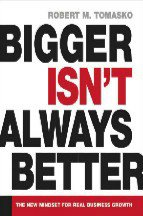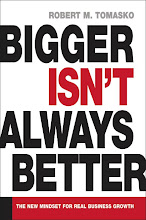November 29, 2005
What's the book about?
Growth.
Growth is not about getting bigger. It’s about progress, forward movement, stretching beyond the limits that currently define and constrain. Real growth involves reaching full potential, not maximum size. It happens when old dominating ideas are challenged, and new ones displace them. Growth means progress, not excess; it is fueled by imagination, not expansion.
Too often growth has become confused with one of its by-products, expansion. Getting bigger may be a by-product of growth, but it is not its main feature. A business that takes the short-cut of pursuing size increase directly – instead of realizing it through the hard work of real growth – is like an athlete taking the steroid route to muscle building.
Bigness is like self-esteem. It is a wonderful feeling when acquired as a by-product of doing well and achieving one’s goals. When gotten this way, it can even serve as a flywheel to generate more success. But the kind of self-esteem that comes from blind optimism and putting a happy face on failure is brittle and unanchored. It tends to do more harm than good.
Why isn’t bigger necessarily better? Bigness begets business bubbles and bullies. It bites back, too. A single-minded focus on getting bigger usually has the opposite effect. Companies that successfully seek it soon find their surroundings become less hospitable, resources less abundant and organizations less functional. At some point it is important for every rapidly expanding organization to ask: where does real business-building end and counterproductive empire-building take its place?
Growth is not about getting bigger. It’s about progress, forward movement, stretching beyond the limits that currently define and constrain. Real growth involves reaching full potential, not maximum size. It happens when old dominating ideas are challenged, and new ones displace them. Growth means progress, not excess; it is fueled by imagination, not expansion.
Too often growth has become confused with one of its by-products, expansion. Getting bigger may be a by-product of growth, but it is not its main feature. A business that takes the short-cut of pursuing size increase directly – instead of realizing it through the hard work of real growth – is like an athlete taking the steroid route to muscle building.
Bigness is like self-esteem. It is a wonderful feeling when acquired as a by-product of doing well and achieving one’s goals. When gotten this way, it can even serve as a flywheel to generate more success. But the kind of self-esteem that comes from blind optimism and putting a happy face on failure is brittle and unanchored. It tends to do more harm than good.
Why isn’t bigger necessarily better? Bigness begets business bubbles and bullies. It bites back, too. A single-minded focus on getting bigger usually has the opposite effect. Companies that successfully seek it soon find their surroundings become less hospitable, resources less abundant and organizations less functional. At some point it is important for every rapidly expanding organization to ask: where does real business-building end and counterproductive empire-building take its place?
The author
Before I read a book, I like to find out a little about the person who wrote it. So here is more about me than fits into the "about me" space at the upper right of this page.
There are a lot of business gurus around. I’m not one of them. And don’t especially want to be. I’m a student of management. I write books to better understand things, and as a way to call attention to new and underused ideas. I write about things I’m curious about and want to know more about – downsizing, new organization forms, positive psychology, growth, etc. I don’t think I’m an especially great new idea creator, but I am pretty good at combining existing insights to create something new. I enjoy spotting concepts from the hard and soft sciences that have applicability to management, and packaging them in easily digestible bites.
The same goes for my consulting. I am most helpful to clients when they ask me to study their situation, playback what I’ve found, and stimulate their thinking about what to do next. I try to avoid situations where I’m supposed to be “the expert.”
I’ve had a life-long interest in figuring out how thing work. This may be a guy thing (?). It started with machines (remember Tinker Toys and Erector sets?) and led me to study physics in college and organizational behavior in grad school. I’m especially interested in how things can be made to happen – what does it take in a given situation to get something done.
I’ve been fortunate to have taken courses from some of the leading thinkers in organization theory – Chris Argyris, Paul Lawrence, Harry Levinson, Ed Schein, Don Schon, and Abraham Zaleznik. But I’ve probably learned the most about organizations and organizing from a training program a Chicago activist, Saul Alinsky, ran. And, as I mentioned in Bigger Isn’t Always Better, I’ve learned a lot more about what growth really means from being a father than working as a management consultant to some of the world’s leading corporations.
For a more long-winded account of my writing, consulting and speaking, click on Bio.
There are a lot of business gurus around. I’m not one of them. And don’t especially want to be. I’m a student of management. I write books to better understand things, and as a way to call attention to new and underused ideas. I write about things I’m curious about and want to know more about – downsizing, new organization forms, positive psychology, growth, etc. I don’t think I’m an especially great new idea creator, but I am pretty good at combining existing insights to create something new. I enjoy spotting concepts from the hard and soft sciences that have applicability to management, and packaging them in easily digestible bites.
The same goes for my consulting. I am most helpful to clients when they ask me to study their situation, playback what I’ve found, and stimulate their thinking about what to do next. I try to avoid situations where I’m supposed to be “the expert.”
I’ve had a life-long interest in figuring out how thing work. This may be a guy thing (?). It started with machines (remember Tinker Toys and Erector sets?) and led me to study physics in college and organizational behavior in grad school. I’m especially interested in how things can be made to happen – what does it take in a given situation to get something done.
I’ve been fortunate to have taken courses from some of the leading thinkers in organization theory – Chris Argyris, Paul Lawrence, Harry Levinson, Ed Schein, Don Schon, and Abraham Zaleznik. But I’ve probably learned the most about organizations and organizing from a training program a Chicago activist, Saul Alinsky, ran. And, as I mentioned in Bigger Isn’t Always Better, I’ve learned a lot more about what growth really means from being a father than working as a management consultant to some of the world’s leading corporations.
For a more long-winded account of my writing, consulting and speaking, click on Bio.
November 28, 2005
A book blog

What do you do when you finish writing a book?
Start a blog about it - at least that's the advice my publisher provided. It's a great way to have a back-and-forth conversation with readers, they said. Authors never get enough direct feedback from their customers. Maybe I'll learn something that I can use as I make speeches about this book and write others. Also, it might be fun to see how relevant the ideas in it are to current events.
Sounds good, so here goes.
